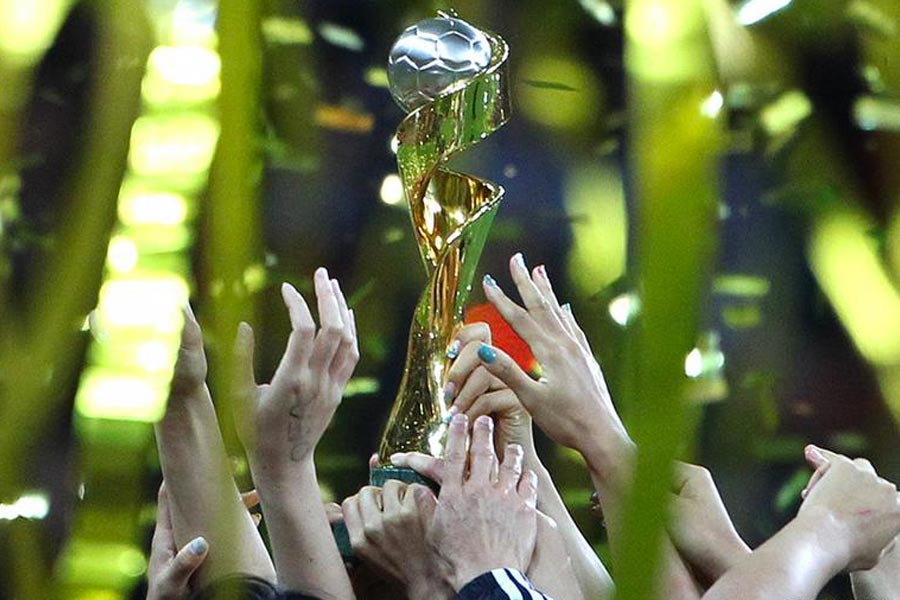World football's governing body FIFA on Wednesday announced that it had struck a deal with the European Broadcasting Union (EBU) to air the 2023 Women's World Cup on free TV in the continent's five biggest markets.
"FIFA is delighted to widen the deal with the European Broadcasting Union for the transmission of the upcoming FIFA Women's World Cup to include the five major markets within their existing networks, namely France, Germany, Italy, Spain, and the United Kingdom, as well as Ukraine, thus ensuring maximum exposure for the tournament," FIFA President Gianni Infantino said in a press release on the organization's website.
No financial details of the deal were announced.
Last-minute haggling in first-ever separate tender
This follows a standoff with FIFA demanding more money from major European broadcasters, even saying it might withhold the rights altogether if necessary, a threat that always rang slightly hollow. German captain Alexandra Popp had earlier called the threat "empty words."
Besides commercial sponsorship deals usually from major corporations and ticket prices on site, TV deals are a core component of FIFA's revenues from such competitions.
They're also a necessary vehicle for airing and promoting the competition; unlike some sports these days, FIFA offers no direct video feeds or subscription services of its own, though it had mooted setting up some such service at the last minute, without explaining how.
FIFA listed German public broadcasters ARD and ZDF, the BBC and ITV in the UK, France Televisions, RAI in Italy and RTVE in Spain. It also listed French broadcaster M6, which is not a part of the EBU.
The competition in Australia and New Zealand begins on July 20, meaning FIFA left the accord almost as late as was possible. It had announced a preliminary deal with 28 European countries — but generally in much smaller and less lucrative markets — last October, closer to the time frame you'd normally expect.
Several European countries that will play in the competition — Sweden, Norway, Denmark, the Netherlands and Portugal — did not feature on Wednesday's updated list of partner broadcast countries.
DFB welcomes deal to avoid 'blackout'
It's the first time FIFA had ever put the Women's competition up for a separate tender, having in the past bundled it in with the rights for the men's World Cup.
FIFA had been arguing that the ratings successes of recent women's football competitions meant that public broadcasters should pay more for the rights.
In Germany, ARD director Axel Balkausky had said his network had made a fair bid for the rights, but "would not allow themselves to be blackmailed."
The head of the DFB, or German FA, Bernd Neuendorf issued a statement saying he was "delighted" at the deal "avoiding a blackout," and said airing the competition would be "of enormous importance for the further development of women's football in Germany."
Germany's women's coach, Martina Voss-Tecklenburg, told DW last month that the limbo left her "speechless," and said that, "for me, there is no alternative. There has to be a deal."
On Wednesday, Voss-Tecklenburg thanked "everyone involved for reaching an agreement."
"Now we can go into the preparation phase with even more momentum and positive energy," she said.
Stellar recent viewing figures face tough time zone test Down Under
TV ratings from the 2019 Women's World Cup in France and the 2022 European Championships in England were impressive in several European countries, Germany included.
Germany's defeat in the final to hosts England in 2022 drew almost 18 million viewers, making it the most watched sports event of the year, with slightly more viewers than the German national team's elimination in the men's World Cup group stage later that year, according to data from a tracking company.
But several factors spoke in the competitions' favor in Europe. The matches took place during prime time evening viewing. And Euro 2022 took place when a men's World Cup should have been competing for viewer eyeballs but was not, because it had to be postponed to the winter in equatorial Qatar.
And of course, Germany's women nearly won the whole thing, attracting fair weather domestic fans later in the competition, while the men crashed out in the group stage for a second straight World Cup.
The upcoming competition in Australia and New Zealand could prove a sterner test of viewers' dedication on the other side of the globe, with games therefore taking place early in the European morning and in the middle of the night in the Americas.











